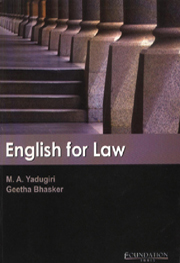Book contents
- Frontmatter
- Preface
- Contents
- A Note to the Student
- Notes to the Teacher
- 1 Nature of Law
- 2 Crimes and Civil Wrongs
- 3 Command of Language in the Profession of the Law
- 4 Plain Language and the Law
- 5 The Indian Constitution
- 6 The Impact of Technology on the Practice of Law
- 7 The International Court of Justice
- 8 Application of Precedents
- 9 Statutory Interpretation
- 10 Legal Reasoning
- 11 Plaints and Writs
- 12 Judgment
- 13 Of Defamation
- 14 Consumer Protection (Amendment) Act, 1993
- 15 The Information Technology Act, 2000
- 16 Universal Declaration of Human Rights
- Answer Key
15 - The Information Technology Act, 2000
Published online by Cambridge University Press: 26 October 2011
- Frontmatter
- Preface
- Contents
- A Note to the Student
- Notes to the Teacher
- 1 Nature of Law
- 2 Crimes and Civil Wrongs
- 3 Command of Language in the Profession of the Law
- 4 Plain Language and the Law
- 5 The Indian Constitution
- 6 The Impact of Technology on the Practice of Law
- 7 The International Court of Justice
- 8 Application of Precedents
- 9 Statutory Interpretation
- 10 Legal Reasoning
- 11 Plaints and Writs
- 12 Judgment
- 13 Of Defamation
- 14 Consumer Protection (Amendment) Act, 1993
- 15 The Information Technology Act, 2000
- 16 Universal Declaration of Human Rights
- Answer Key
Summary
PREAMBLE
An Act to provide legal recognition for the transactions carried out by means of electronic data interchange and other means of electronic communication, commonly referred to as ‘Electronic Commerce’, which involve the use of alternatives to paper-based methods of communication and storage of information, to facilitate electronic filings of documents with the Government agencies and further to amend the Indian Penal Code, Indian Evidence Act, 1872, The Bankers' Books Evidence Act, 1891, and the Reserve Bank of India Act, 1934 and for matters connected therewith or incidental thereto.
WHEREAS the General Assembly of the United Nations by resolution A/RES/51/ 162, dated 30 January 1997 has adopted the Model Law on Electronic Commerce adopted by the United National Commission on International Trade Law;
AND WHEREAS the said resolution recommends inter alia that all States give favourable consideration to the said Model Law when they enact or revise their laws, in view of the need for uniformity of the law applicable to alternatives to paper-based methods of communication and storage of information;
AND WHEREAS it is considered necessary to give effect to the said resolution and to promote efficient delivery of Government services by means of reliable electronic records,
- Type
- Chapter
- Information
- English for Law , pp. 482 - 511Publisher: Foundation BooksPrint publication year: 2005
- 8
- Cited by

